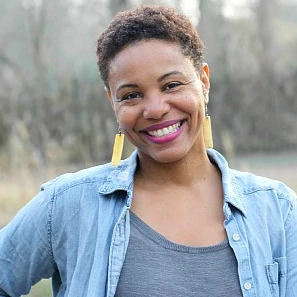[ad_1]
“How can we say that we don’t want African-American influencers applying for this campaign without offending anybody?”
That was the start of a very real conversation with a colleague at a marketing agency I worked at. During a campaign planning meeting for a beauty brand, filled with sales managers and directors, not one person of color was in the room when they came to the conclusion that Black women wouldn’t be a good fit to promote the product.
As the Community Manager, it was my job to help them get the message across.
READ MORE: Dr. Venus Opal Reese is empowering Black women to launch businesses

Instead, I educated my colleague on why the beauty brand’s excuse that they “don’t have shades for Black women” was ridiculous. Black women come in shades from alabaster to ebony. Then I asked why no one in the room pushed back on behalf of our influencers. And why no one escorted the beauty brand out of the room because their values weren’t a good fit for ours.
But I already knew the answer.
No one in the room was Black. None of these things had even crossed their minds.
I left the company a few months later before I even had another job lined up. I was exhausted from being the only minority representative, and I didn’t have any real power anyway.
Over the last few days, some of my favorite brands and companies have shared graphics sharing their stance on social justice, and particularly Black Lives Matter.
READ MORE: Companies touting Black Lives Matter face workforce scrutiny
It doesn’t go unnoticed as my friends and I keep track of who is solidly proclaiming themselves to be down for the cause. And also as we watch those who are silent.
As my inbox filled with letters of solidarity signed by CEOs of major companies, I started to wonder. If these folks believe that Black Lives Matter, then why don’t they hire Black lives and put them in positions of power at their organizations to start dismantling the economic imbalance between white men and virtually everyone else in this country?

It’s quite simple, really. They don’t have to. It’s too much work. It’s not that important to them. No one is holding them accountable.
The first rebuttal companies usually have for why their company doesn’t have any Black people in leadership positions is that there is a lack of talent in the pipeline. That is so lazy. But, I’ll play along.
So that there is no confusion, here are some ideas for finding skilled Black professionals:
Recruit at historically Black colleges and universities
When Fortune 500 or tech companies are looking for new talent, they rarely venture outside of the Ivy Leagues or high-ranked PWIs. Historically Black Colleges and Universities (save for a few of the faves like Howard, Spelman, and Morehouse) are left off of the recruitment itinerary.
If they were to venture outside of the comfort zone of schools that feel familiar, companies would find a gigantic pool of brilliant Black folks. Schools like North Carolina A&T, Morgan State University, or my alma mater, Fayetteville State University, are not only training professionals who can do the work. They’re also raising leaders with a strong understanding of the importance of community, exemplary social competency, and a global perspective that takes good brands and helps them to become great.
Hire a staffing company that is committed to, and trained in, unbiased interview and hiring practices
The most obvious reason that some hiring managers think there are no qualified Black professionals is that recruiters never even sent the Black professionals’ resumes along. They take a look at the name on the resume, or the college, and press delete.
If you want to be sure your company has an unbiased hiring practice, and you want your team to be diverse and inclusive, it’s important to have a staffing company or staff that understands what the biases are that they need to avoid in the first place.
Take your interviews seriously
When you interview a Black professional, give them your attention. Put down your phone (looking at you tech companies), engage, and listen to the candidate’s skills and experience.
Black women are notoriously (underpaid and) under-titled. At one job, I wrote the original curriculum 2-4 times a year for thousands of students in grades K-12. I created and led workshops for hundreds of educators. I also represented the organization as a speaker and presenter locally and nationally. My title? Arts Specialist.
If you’re only looking at the resume, and not taking the opportunity to dig deeper, you’re likely missing out on some amazing talent.
Google. Search LinkedIn. Share your job listing with professional African-American organizations
It always blows my mind when huge tech companies filled with brilliant geniuses can’t figure out how to do the bare minimum to find qualified Black employees. Seriously. Do better.
Now let’s unpack why you’re overlooking the Black people who already work for you.
Ever since I started working, I’ve seen Black women, in particular, be overlooked for leadership positions that they were more than qualified for. In some cases, they were already doing the work. Sometimes an outside candidate would get the job. In other instances, a ringer from inside the company (i.e. the boss’s niece) ended up with the role.
Here’s what I believe. I believe that some white leaders are unwilling to promote Black professionals to leadership positions because they don’t want the headache of being called to task. Not just on matters of diversity, but about anything that is outside the scope of their lived experience and thus is not that important to them.
I think some white leaders don’t want to promote Black professionals to leadership positions because the thought of opening up their personal life and getting to know someone who might have a different background than them feels exhausting and they don’t want to do it.
The most egregious and hurtful reason Black professionals aren’t promoted to leadership positions? Because no matter how much we do for the company, regardless of how much time, energy, effort, and heart we put into the work, many white leaders just can’t see a Black person as their equal.
That marketing agency I worked at didn’t even consider how hurtful it would be and how unsafe their request would make me feel. I wasn’t like them. I didn’t have feelings.
If you shared about Black Lives Matter, but it’s not reflected in your organization, I’m not discrediting your sentiment. I see your gesture, and I appreciate you trying.
That graphic? That was step one.
Actually, that was the prologue.
If you truly believe that Black Lives Matter, show it by using this moment as an opportunity to learn how to support actual Black lives in getting what matters to us.
And really, it’s the same thing that matters to you.
To create a legacy for our children.
To build great products, tell interesting stories, and serve our fellow humans.
Liberty. And justice.
That’s all.
 Brandi Riley is an Oakland-based Parenting Influencer, Community Manager, and Educator. Follow her on Instagram at @BrandiJeter.
Brandi Riley is an Oakland-based Parenting Influencer, Community Manager, and Educator. Follow her on Instagram at @BrandiJeter.
Have you subscribed to theGrio’s new podcast “Dear Culture”? Download our newest episodes now!
[ad_2]
Source link


